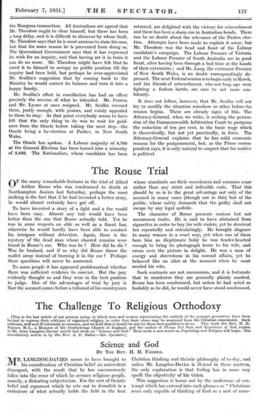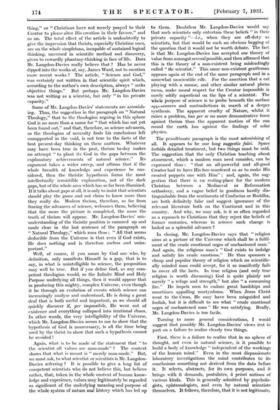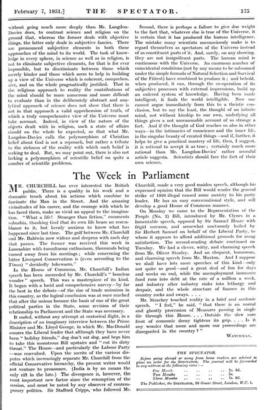The Challenge To Religious Orthodoxy
[This is the last article of our present series, in which men and women representing the outlook of the younger generation have been Invited to express their criticism of organized religion, in order that their views may be answered from the Christian standpoint. Such criticism, well and ill-informed, is common, and we hold that it should be met by those best qualified to do so. This week the Rev. H. H. Farmer, M.A. a Minister of the Presbyterian Church of England, and the author of Things Not Seen and Experience of God, replies to Mr. John M.A., article last week on "Science and God." Next week a new series on Psychology and Religion will begin. The introductory article is by the Rev. A. E. Baker.—En. Spectator.]
Science and God
BY Tag REV. H. H. FARMER.
A/R. LANGDON-DAVIES seems to have brought to 13-1- his consideration of Christian belief an antecedent disrespect, - with the result that he has unconsciously fallen into the error of which he accuses religious people, namely, a distorting subjectivism. For the sort of theistic belief and argument-which he sets out to demolish is a Caricature of what actually holds the field in the best Christian thinking and theistic philosophy of to-day, and unless Mr. Langdon-Davies is ill-read in these matters, the only explanation is that feeling has in some way spoilt the objectivity of his vision.
This suggestion is borne out by the undertone of con. tempt which has entered into such phrases as " Christians seem only capable of thinking of God as a sort of some- thing," or " Christians have not merely prayed to their Creator to please alter His creation in their favour," and so on. The total effect of the article is undoubtedly to give the impression that theists, especially Christian ones, arc on the whole simpletons, incapable of sustained logical thinking, unversed in scientific method and discovery, given to cowardly phantasy-thinking in face of life. Does Mr. Langdon-Davies really believe that ? Has he never dipped into the works of, say, James Ward, not to mention more recent works ? The article, " Science and God," was certainly not written in that scientific spirit which, according to the author's own description, always " seeks objective things." But perhaps Mr. Langdon-Davies was not writing as a scientist, but only " in his private capacity."
Some of Mr. Langdon-Davies' statements arc astonish- ing. Thus, the suggestion in the paragraph on " Natural Theology," that to the theologian arguing in this sphere God is no more than a name for " that which has not yet been found out," and that, therefore, as science advances, so the theologian of necessity finds his conclusions left unsupported in the void, is not true to the facts of the best present-day thinking on these matters. Whatever may have been true in the past, theism to-day makes no attempt " to plant its God in the gaps between the explanatory achievements of natural science." Its argument takes a wider sweep, and affirms that if the whole breadth of knowledge and experience be con- sidered, then the theistic hypothesis forms the most intellectually irresistible explanation, not of the dark gaps, but of the whole area which has so far been illumined. If it talks about gaps at all, it is only to insist that scientists should play the game and not claim to know more than they really do. Modern theism, therefore, so far from fearing the advances of science, welcomes them, believing that the more the picture is completed, the more the truth of theism will appear. Mr. Langdon-Davies' mis- understanding of the theistic position is summed up and made clear in the last sentence of the paragraph on " Natural Theology," which runs thus : " All that seems deducible from the Universe is that even if God exists, He does nothing and is therefore useless and unim- portant."
Well, of course, if you mean by God one who, by definition, only manifests Himself in a gap, that is to say, in what is unintelligible to science, the proposition may well be true. But if you define God, as any com- petent theologian would, as the Infinite Mind and Holy Purpose underlying all things, then it would appear that in producing this mighty, complex Universe, even though it be through an evolution of events which science can increasingly analyse and understand, He is doing a great deal that is both useful and important, as we should all quickly discover if, per impossibile, He went out of existence and everything collapsed into irrational chaos. In other words, the very intelligibility of the Universe, which Mr. Langdon-Davies seems to use to show that the hypothesis of God is unnecessary, is all the time being used by the theist to show that such a hypothesis cannot be avoided Again, what is to be made of the statement that " to the scientist all values are man-made" ? The context shows that what is meant is " merely man-made." But, we must ask, to what scientist or scientists is Mr. Langdon- Davies referring ? It is possible to give a long list of competent scientists who do not believe this, but believe rather, that, taken in the whole context of human know- ledge and experience, values may legitimately be regarded as significant of the underlying meaning and purpose of the whole system of nature and. history which has led up to them. Doubtless Mr. Langdon-Davies would say that such scientists only entertain these beliefs " in their private capacity "—i.e., when they are off-duty as scientists, but that would be such an obvious begging of the question that it would not be worth debate. The fact is that Mr. Langdon-Davies has accepted one theory of value from amongst several possible, and then affirmed that this is the theory of a non-existent being misleadingly called " the scientist." This same non-existent gentleman appears again at the end of the same paragraph and in a somewhat unscientific r6le. For the assertion that a cat playing with a mouse, and other similar natural pheno mena, make moral respect for the Creator impossible is surely oddly superficial on the lips of a scientist. The w.bale purpose of science is to probe beneath the surface appcarances and contradictions in search of a deeper synthesis. The apparent cruelty of Nature, whilst it raises a problem, has per se no more demonstrative force against theism than the apparent motion of the sun round the earth has against the findings of solar physics.
The penultimate paragraph is the most astonishing of all. It appears to be one long suggestio falsi: Space forbids detailed treatment, but two things must be said. The suggestion that the only Christian teaching about atonement, which a modern man need consider, can be expressed thus : " that an all-powerful and all-good Creator had to have His Son murdered so as to make His created puppets one with Him" ; and, again, the sug- gestion that there is no resting-place for the modern Christian between a Mediaeval or Reformation orthodoxy, and a vague belief in goodness hardly dis- tinguishable from the sentiments of Confucius or Buddha, are both definitely false and suggest ignorance of the relevant literature both on the Continent and in this country. And why, we may ask, is it so often regarded as a reproach to Christians that they reject the beliefs of former centuries, whereas in science such change is hailed as a splendid advance ?
In closing, Mr. Langdon-Davies says that " religion aims at a picture of the Universe which shall be a fulfil- ment of the crude emotional urges of unchastened man." And again, the religious man's " God exists to indulge and satisfy his crude emotions." He thus sponsors a cheap and popular theory of religion which no scientific- ally minded man could accept, for it so manifestly fails to cover all the facts. In true religion (and only true religion is worth discussing) God is quite plainly not merely " a refuge and strength," but also " a consuming fire." He impels nien to endure great hardships and sometimes appalling martyrdoms. When Jesus Chriit went to the Cross, He may have been misguided and foolish, but it is difficult to see what " crude emotional urges of unchastened man " He was satisfying. Really, Mr. Langdon-Davies is too facile.
Turning to more general considerations, I would suggest that possibly Mr. Langdon-Davies' views rest in part on a failure to realize clearly two things.
First, there is a failure to realize that in no sphere of thought, not even in natural science, is it possible to build a body of knowledge " independent of the workings of the human mind." Even in the most dispassionate laboratory investigations the mind contributes to its conclusions something not derived from the data before it. It selects, abstracts, for its own purposes, and it brings with it demands, postulates, a priori notions of various kinds. This is generally admitted by psycholo- gists, epistemologists, and even by natural scientists themselves. It follows, therefore, that it is not legitimate, without going much more deeply than Mr. Langdon- Davies does, to contrast science and religion on the ground that, whereas the former deals with objective things, the latter only deals in subjective fancies. There are pronounced subjective elements in both these approaches of the mind to its world. The task of know- ledge in every sphere, in science as well as in religion, is not to eliminate subjective elements, for that is for ever impossible, but to discriminate between those which merely hinder and those which seem to help in building up a view of the Universe which is coherent, comprehen_ sive, and on the whole pragmatically justified. That in the religious approach to reality the contributions of the mind should be more numerous and more difficult to evaluate than in the deliberately abstract and ana- lytical approach of science does not show that there is not in that approach a valid apprehension of truth, of which a truly comprehensive view of the Universe must take account. Indeed, in view of the nature of the objects dealt with in religion, such a state of affairs should on the whole be expected, so that what Mr. Langdon-Davies. calls the polymorphism of Christian belief about God is not a reproach, but rather a tribute to the. richness of the reality with which such belief is seeking to deal. But, we may point out, there is also not lacking a polymorphism of scientific belief on quite a number of scientific problems. Second, there is perhaps a failure to give due weight to the fact that, whatever else is true of the Universe, it is certain that it has produced the human intelligence. The mistake many scientists unconsciously make is to regard themselves as spectators of the Universe instead of as constituent parts of it. And, surely, on any showing, they are not insignificant parts. The human mind is continuous with the Universe. An enormous number of coincidental conditions (not by any means to be subsumed under the simple formula of Natural Selection and Survival of the Fittest) have combined to produce it ; and behold, when produced, it can, through the co-operation of its subjective processes with external impressions, build up an ordered system of knowledge. Having been made intelligent, it finds the world intelligible. Now one cannot argue immediately from this to a theistic con- clusion, but to say the least, the thought of an infinite mind, not without kinship to our own, underlying all things gives a not unreasonable account of so strange a fact. And if the thought of God reaches us also in other ways—in the intimacies of conscience and the inner life, in the singular beauty of created things—and if, further, it helps to give a practical mastery of life, then, I suggest, it is rational to accept it as true ; certainly much more rational than Mr. Langdon-Davies' rather scornful article suggests. Scientists should face the fact of their own science.












































 Previous page
Previous page